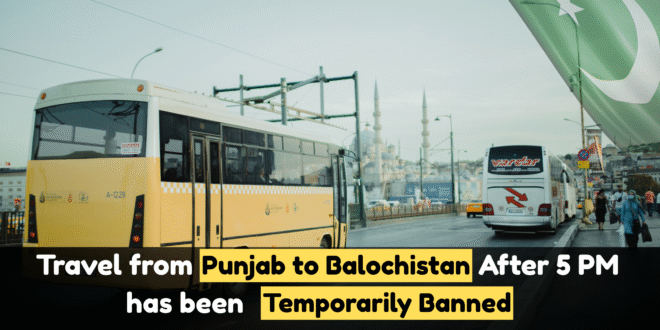Travel from Punjab to Balochistan: On July 22–23, 2025, the Deputy Commissioner of Dera Ghazi Khan, Muhammad Usman Khalid, announced that all public and private vehicles traveling from Punjab to Balochistan would be prohibited from crossing major border checkpoints (notably Bawata and Sakhi Sarwar) after 5 PM, until daylight returns—approximately 5 AM the following morning. This includes buses, coaches, and private cars.
Reason: Escalating Security Threats
Surge in Terrorist Incidents
This emergency restriction is a response to a disturbing rise in Militant Attacks targeting passenger transport along National Highway N‑70 and adjoining roads. Among the recent atrocities was a deadly attack in the Sur-Dakai region, where nine Punjab-origin passengers were abducted and killed by militants, with the banned Balochistan Liberation Front claiming responsibility.
Previously, Balochistan authorities had already imposed a nighttime ban on public transport across several highways (N-10, N-25, N-65, N-40, N-70, N-50) from 6 PM to 6 AM, citing frequent ambushes and roadside killings.
Security Tightening Measures
Enhanced Protocols at Checkpoints
The official notification outlined strict measures at vehicle departure and entry points:
-
Video recording of all passengers before departure.
-
Every bus must have two armed private security guards.
-
Functional CCTV inside and outside vehicles to monitor boarding and travel.
These additions mark a dramatic escalation from previous security advisories, aiming to deter insurgent threats specifically targeting Punjab-origin travelers.
Transporters React: A Mixed Response
Industry Pushback on New SOPs
Meanwhile, the All Balochistan Transporters Alliance criticized many of these protocols—including night travel restrictions, security personnel mandates, surveillance cameras, tracking devices, and panic buttons—as “unfeasible, ineffective” and burdensome. Their concerns include:
-
Inability of two security guards to defend against well-armed gangs.
-
Encouraging panic and deterrence rather than protection.
-
Risk of vehicles being stranded overnight in remote, dangerous areas.
-
Suggesting the measures are politically motivated rather than security-oriented.
They urge authorities to coordinate directly with the transport community to develop realistic security solutions.
Operational Scope & Impact on Travelers
-
Effective daily from 5 PM to 5 AM, until further notice.
-
Enforced at DG Khan, Sakhi Sarwar, Bawata and other major crossings.
-
Travelers advised to adjust plans: start journeys only in daylight hours.
-
Non-compliance will result in refusal to cross at border posts and possible legal penalties.
Wider Implications
1. Strategic Disruption
The ban isolates Balochistan from Punjab during high-risk hours, limiting insurgents’ ability to hijack vehicles under cover of darkness.
2. Civilian Inconvenience
Daily-life disruptions are expected, especially for emergency travel and cross-border commerce—heightening the debate around balancing security and civil freedom.
3. Insurgent Countermeasures
Armed groups—historically known for establishing roadblocks and ambushing buses—may shift tactics, targeting daytime convoys or checkpoints.
Conclusion
This travel ban from Punjab to Balochistan after sunset reflects a worrisome uptick in militant activity targeting civilians, especially those from Punjab. With provinces enforcing nighttime closures and implementing strict security protocols, the move aims to preempt further violence. However, the backlash from transport operators highlights practical challenges and civil rights concerns. Effective coordination between the government, law enforcement, and the transport sector will be crucial to safeguard lives without paralyzing legitimate movement.




